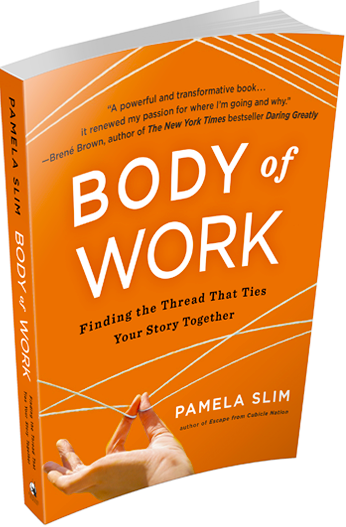Enjoy the adventure of your craft
I was pretty fearless in my teens and twenties.
I figured out how to get myself to Switzerland as an exchange student at sixteen, with little money and no contacts.
I had many adventures in college in Mexico and Colombia, often traveling alone and having some dangerous experiences, like being held up at knifepoint and walking home alone after a late night of salsa dancing (sorry, Mom).
I lived in Rio de Janeiro for six months by myself while I trained in the Afro-Brazilian martial art of capoeira.
And much earlier in my life, as soon as I really got the hang of books, I loved to read stories of myths and adventures from all over the world.
I think intense devotion to your craft is a commitment to going on a hair-raising adventure.
Unfortunately, we often focus too much on the outcome of our creative projects instead of the fun, and often painful, process of bringing them to life.
As a wide-eyed first-time author who was struggling to put pen to paper, I got some great advice from the publisher of my first book: “Write the damned book,” he said.
And now having written the damned book (two actually), I will tell you that it was an adventure to the grandest scale of my childhood dreams. I fought demons. I interviewed kings and queens. I scaled the highest mountains of impossibility, gave up, died, and somehow came back to life in time to finish the last chapter. All while changing tiny baby diapers, managing play dates, serving clients, and dealing with economic warfare all around me.
I think craft has spirit.
In individual sessions with clients, writing on my own, or in a large room teaching a group of people, there are moments of intense and utter grace.
They come when you immerse yourself in your work and feel like you have to know how to do it better or else you will lose your quest and the king will behead you in the public square.
They come when you feel ideas rising up in your chest and you know, for certain, that they are turning into something big and powerful, as if conjured by a magic spell.
Craft is not a rote, calculated path. It is an explosive, messy, terrifying, and passionate adventure.
How can your work take you on a journey?
 What dragons are to be slayed?
What dragons are to be slayed?
What myths are to be broken?
What music is meant to be danced to, until there is no separation between beat, body, and spirit?
Which battles are to be fought?
What deep, passionate love is to be made?
What inner tiger is meant to be released from its chains?
How would you feel differently about your craft if you viewed it as a noble adventure?
One of the great burdens of creative people is wondering, after looking at what they have done: “Is this all just a bunch of meaningless drivel? Do I have any idea what I am doing?”
It is also the great burden of experienced creatives.
As a little girl, I sat in the darkroom with my dad as he showed me subtle manipulations to the printing of photographs that made a huge difference in the feeling and look of the picture.
I watched him smile as he found the one shot in eighty that captured just the right collection of facial expressions in a group shot.
To my dad, a craft is a noble undertaking. He takes his photography seriously.
Even in the last quarter of your life, you can never consider yourself a master at the end of the journey.
Choose adventure.
When you choose the adventure of your craft, you find unexpected, beautiful, and unlikely twists and turns that you never expected.
Differentiation, as the marketing wonks like to say.
Are you on an adventure?
Who is the hero?
Who are you trying to save?
How would your work be different if you didn’t have to sound pithy or appear perfect?
Develop a mastery mindset
 Your body of work will broaden and deepen over time. Its value is determined by your commitment to continually improve your skills, and deepen your ingredients.
Your body of work will broaden and deepen over time. Its value is determined by your commitment to continually improve your skills, and deepen your ingredients.
When you focus on mastering your chosen craft, many opportunities open up for you.
In today’s world of hacks, shortcuts, and instant money-making blueprints, I think we have lost appreciation for slow-brewing mastery in our work.
Through the years, I have worked with many martial artists, cultural leaders, and business mentors who have taught me that trying to finish first in a short race is not only stressful, it also works against developing deep expertise.
Here are seven ways to develop a mastery mindset.
Learn patience
My mother-in-law has taught me that Diné people (Navajos) have ceremonies for every part of life.
There are ceremonies at a baby’s first laugh, at puberty, and for the changing seasons. There are water ceremonies and lightning ceremonies and blessing ceremonies. In these sacred gatherings, a conversation is slow and deliberate and unhurried. An elder can take an entire hour to share a teaching or to bless a meal. I have watched elders see a young person squirm with impatience, then choose to talk slower and longer. They do this because they know that learning to settle down and develop patience is going to help the young develop thoughtfulness, depth and wisdom.
Practice the basics
When we first learn a new skill, we dive into it with abandon, taking classes, learning from mentors and practicing like crazy. When we reach a certain level of success, we often get lazy. True masters never stop practicing the basics. Martial artists do push-ups and sit-ups every day of their lives. Artists practice brush strokes. Writers write daily. Entrepreneurs create, market, and sell. When you don’t practice the basics, they go away.
Appreciate the source of your materials
In the film Jiro Dreams of Sushi, Jiro’s son walks slowly around the fish market, looking for the perfect fish for the evening meals. He has relationships with fishermen who will not sell their product to anyone but him. Great work is built with great materials, by people and partners who care as much about what they do as you care about what you do. Avoid cheap, sloppy, and poorly constructed tools and materials.
Set boundaries
You cannot create great work if you are in a constant state of defense. You must protect your creative work time by blocking out your schedule, turning off your phone, and closing down your e-mail. You must protect your creative energy by avoiding “life-sucking squids,” as my friend Martha Beck calls people who care only about their own edification and not about your needs or soul.
Make your space holy
When you respect your work, you want to create a beautiful, clean, sacred container for it. Regardless of the size, cost, or fanciness of your physical space, treat it with reverence. Pay attention to what you bring into it. Take time to clean the floor and wash the windows. Surround yourself with images of beauty and inspiration. Give gratitude to the tools that you use to do your work and to all the masters who have come before you.
Cultivate your voice
While you can become fluent in another language, you will never feel more anchored and at home than when you are speaking your native tongue. Explore your voice. Listen to your intuition. Write down your thoughts. Develop your ideas. Don’t get distracted by your love for someone else’s voice, which will only lead to cheap knockoffs.
Swallow your pride
True mastery is based on a love affair with your work. You want to take a great photograph, or write a great paragraph, or lead a transformational coaching call because you want to make the profession proud.
You want to please the past masters and the art itself. If your work is criticized or isn’t up to your own standards, don’t take it personally. If you receive lots of accolades and exposure, don’t let it get to your head. Keep your focus on honoring your profession.
When imitated, don’t retaliate, innovate
When you are great at what you do, people are bound to imitate you. Sometimes they will try to steal your intellectual property, or students, or employees or business model, or artistic genre. It is natural to get upset when this happens. But instead of fighting with the imitator, move on to innovate the next stage of your work. If you are doing your job well, your work is constantly improving and growing. Imitate that.
Once you begin to cultivate a mastery mindset, life slows down and you appreciate the delicious nuances in every moment. And when you sink into that way of living, you may begin to realize that mastery is not even the end goal.
Excerpt from Body of Work
By Pamela Slim







